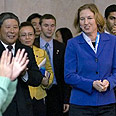
Livni with Chinese students
צילום: איי פי
Livni 'encouraged by debate caused by Iran sanctions'
Foreign minister tells students in Beijing, 'We must act fast as time is not on our side'
The sanctions imposed on Iran are not against the Arab world, Foreign Minister Tzipi Livni explained Monday in a meeting with students at the Peking University.
According to Livni, "The sanctions will add to the stability in the region, as Arab countries are also threatened by Iran."
The foreign minister stressed that the sanctions issue was creating an internal debate in Tehran.
"Many elements in Iran care about what happens around them, and some even seek international legitimization. The world has an influence on Iran and we expect the international community to impose more sanctions. We must act fast because time is not on our side."
Answering to a question on Beijing's part in the sanctions, Livni said that "China has a deciding role on this matter, as it is a permanent Security Council member, and the consensus with which these decisions are made is highly important.
"So far, the desire to reach a consensus on the recent decisions made by the Security Council has led to compromises on the sanctions. The sanctions will benefit us when they touch on the issues important to the other side. So far, they haven't been enough."
'Real battle is between extremists and moderates'
The Iranian regime, the foreign minister said, is "a regime based on a radical religious ideology which wishes to impose its opinions on the free world. It does that through the terror organizations operating in the Middle East, including Hizbullah, which is destabilizing the situation in Lebanon, and Hamas in the Palestinian Authority. We must not reach the point in which Iran obtains the technology it is after."Addressing the Iranian threat on Israel, Livni said that "we are not only talking about the nuclear plans. The Iranian regime's statement that it wishes to destroy Israel, wipe it off the map, and the Holocaust denial – must all be dealt with harshly by the international community.
"This shows that the real battle is between the extremists – including Iran – trying to sabotage our rights and joint values, and the moderates who share these values – in Israel, as well as in China, in the Arab world and in other places in the world."
The foreign minister's visit to Beijing is expected to end Tuesday evening. On Monday, Livni received a phone call from Prime Minister Ehud Olmert, who informed her that he had been diagnosed with signs of prostate cancer.
Livni is scheduled to meet with China's prime minister and foreign minister. On Monday she met with Chinese newspaper editors and heads of research institutes.
She is also expected to visit the Chinese Wall and sign tourism and cooperation agreements between Israel and China.










